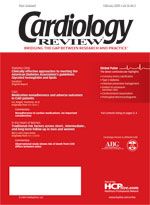Publication
Article
Cardiology Review® Online
Letter to the Editor: Metformin and diabetes
I read with interest the article by Salpeter1 and the commentary by Hoogwerf2 regarding the administration of metformin to prevent diabetes in people at high risk of developing diabetes. Metformin, however, is known to cause lactic acidosis in some patients, and unrecognized lactic acidosis can be fatal. Therefore, the question that must be asked is if the benefit to be gained by using metformin (in delaying or preventing the onset of diabetes) is worth the risk of lactic acidosis, especially when most studies show that the best way to delay or prevent diabetes is by diet and exercise.
I have shown that diabetic patients whose lipid levels and blood pressure are properly controlled and who have never smoked cigarettes have a normal lifespan.3 At the same research presentation, I also showed that no patient with impaired glucose tolerance (IGT) developed any form of atherothrombotic disease (ATD) in the absence of at least 1 of the 3 major ATD risk factors: cigarette smoking, dyslipidemia, and hypertension.
In conclusion, since intensive treatment of blood sugar in diabetic patients does not reduce all-cause mortality (ACCORD4 and ADVANCE5 trials), it follows that intensive treatment of blood sugar in patients with IGT will not decrease mortality either (and since microvascular disease does not occur in IGT, it follows that intensive treatment of blood sugar in IGT will not decrease microvascular disease). Instead, I would suggest that physicians should concentrate on treating the 3 major ATD risk factors and use diet and exercise to treat IGT.
William E. Freeman, Jr, MD
via e-mail
References
1. Salpeter SR. A systematic review of metformin treatment in persons at risk for diabetes mellitus. Cardiology Review. 2008;25(7):14-18.
2. Hoogwerf B. Should metformin be used to prevent diabetes in high risk patients. Cardiology Review. 2008; 25(7):20-21.
3. Feeman WE Jr. How to decrease the rate of death from cardiovascular disease in diabetics with cardiovascular disease. Paper presented at: American Academy of Family Physicians Annual Scientific Assembly; October 1-5, 2003; New Orleans, LA.
4. Gerstein HC, Miller ME, Byington RP, et al; Action to Control Cardiovascular Risk in Diabetes Study Group. Effects of intensive glucose lowering in type 2 diabetes. N Engl J Med. 2008;358(24):2545-2559.
5. Patel A, MacMahon S, Chalmers J, et al; ADVANCE Collaborative Group. Intensive blood glucose control and vascular outcomes in patients with type 2 diabetes. N Engl J Med. 2008;358(24):2560-2572.
Dr Salpeter responds:
I appreciate Dr Feeman’s thoughtful comments concerning the risks and benefits of metformin treatment when used to improve cardiovascular risk factors and reduce the risk for developing new-onset diabetes. Dr Feeman’s main concern, which is that metformin may increase the risk for lactic acidosis, is a common one; however, we now have good evidence that, in fact, metformin does not increase the risk for lactic acidosis compared with other diabetes treatments.1-3 A meta-analysis that pooled data from almost 100,000 patient-years of diabetes treatment found no cases of lactic acidosis associated with the use of metformin.2 A recent nested case-control study using the United Kingdom—based General Practice Research Database estimated that lactic acidosis occurs in 3 cases per 100,000 person-years of metformin users and 5 cases per 100,000 person-years among users of sulfonylureas.3 All of the cases found were associated with a significant comorbidity that may have caused the lactic acidosis, such as acute renal failure, acute heart failure, or septic shock. We can see here that the potential benefits of improving cardiovascular risk factors and reducing the incidence of diabetes far outweighs the potential risk of lactic acidosis.
I wholeheartedly agree that the main concern for patients with and without diabetes is to control metabolic risk factors, such as obesity and dyslipidemia, with the use of diet and exercise, supplementing with medications as necessary. I also agree with the accumulating evidence that the intensive lowering of blood glucose with the use of insulin, sulfonylureas, and thiazolidinediones results in an increase in weight and other metabolic risk factors, and may in fact increase mortality.4 However, metformin can significantly reduce weight and has been shown to reduce cardiovascular morbidity and mortality compared with other antidiabetic drugs.5,6
My conclusion from the available evidence is that metformin treatment in persons at risk for diabetes results in improvements in weight, dyslipidemia, and insulin resistance, and significantly reduces the risk for new-onset diabetes. We should consider the use of metformin in addition to intensive lifestyle modifications to reduce all metabolic and cardiovascular risk factors. Future studies will be needed to show that the metabolic benefits of metformin treatment results in a reduction in cardiovascular morbidity and mortality.






